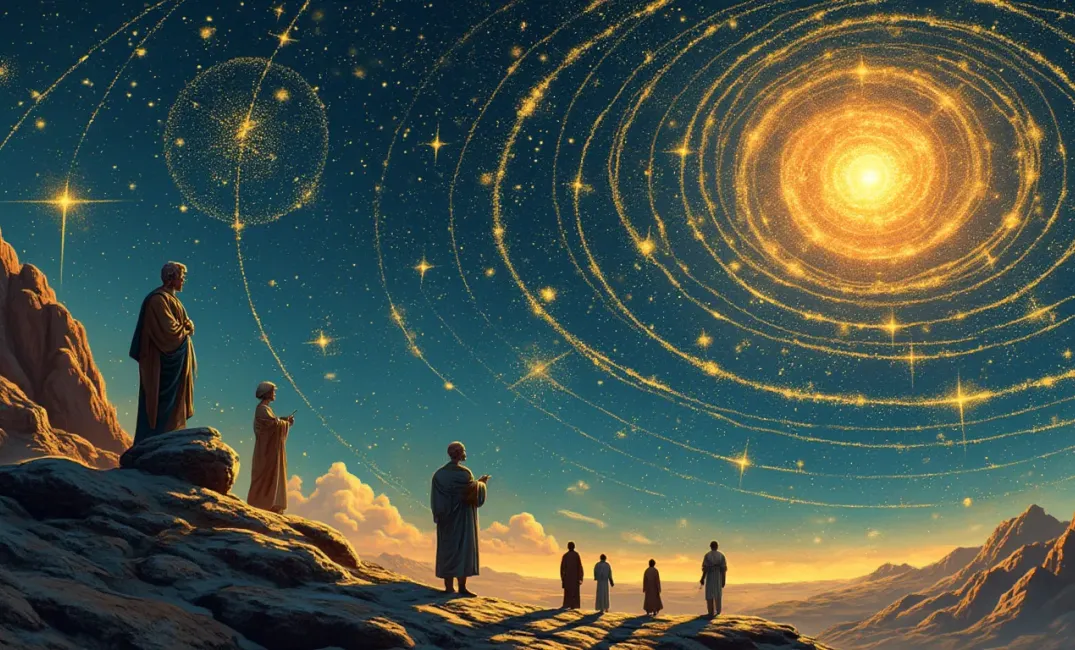In the ever-expanding narrative of human history, philosophical thought emerges as a guiding force, molding society's understanding of existence, morality, and purpose.
The Dawn of Philosophical Thought
Philosophy begins with the contemplation of existence—the desire to understand the nature of reality, knowledge, and the self. Its origins predate recorded history, a timeless dialogue with the universe and one another, starting from basic existential queries to sophisticated systems of belief.
- Ancient Greece looms large in this realm with figures such as Socrates, Plato, and Aristotle, who laid the groundwork for Western thought. Their inquiries into ethics, politics, and metaphysics continue to resonate.
- Eastern philosophies, including Hinduism, Buddhism, Confucianism, and Daoism, provided profound insights into the nature of self, harmony, and the cosmos, advocating balance and enlightenment.
- Indigenous philosophies, often underappreciated, held truths about the interconnectedness of life and the sacredness of nature.
Through these varied lenses, humanity explored questions that transcended borders, offering universal reflections on life's purpose and our place in the world.
The Age of Reason and Moral Philosophy
The Enlightenment period reinvented philosophy with a focus on reason, science, and human rights. Thinkers like Descartes, Kant, and Locke redefined the relationship between the individual and society, pioneering developments in moral and political philosophy.
- Rationalism emphasized reason as the primary source of knowledge, with Descartes’ famous assertion,
Cogito, ergo sum("I think, therefore I am"), framing consciousness as the definitive proof of existence. - Empiricism argued for sensory experience as the foundation of all knowledge, championed by philosophers like David Hume.
- Kant's critical philosophy ushered in the ideas of autonomy and universal moral law, emphasizing duty and the categorical imperative as the backbone of ethical conduct.
These philosophical inquiries fostered democracy, universal suffrage, and the abolition of slavery, illuminating paths for societal evolution through ethical considerations.
The Social Contract and Political Ethics
The discourse on governance and rights found new vigor in the concept of the social contract, theorizing the origin of organized society and the legitimacy of authority.
- Hobbes described life in a "state of nature" as "nasty, brutish, and short," necessitating a strong sovereign authority for peace.
- Locke countered with a vision of government as a protector of natural rights, laying groundwork for modern democracy.
- Rousseau envisioned a society that prioritized the collective will, advocating for true freedom through communal agreement.
These ideas informed political systems worldwide, challenging tyranny and advocating for governance structures aligned with human dignity and freedom.
The Modern Philosophical Landscape
The 19th and 20th centuries introduced profound shifts in philosophical thought, with responses to industrialization, global conflict, and existential uncertainty.
- Nietzsche's critique of traditional morals and his concept of the Übermensch (Overman) offered radical re-evaluations of societal values.
- Existentialists like Sartre and Camus pondered the meaning of life in a deterministic universe, emphasizing human freedom and responsibility in an inherently indifferent cosmos.
- Marxism scrutinized the socioeconomic structures underpinning human inequality, influencing political ideologies worldwide.
Contemporary thinkers continue to grapple with challenges of technology, environmental ethics, and social justice, seeking philosophies attuned to modern dilemmas.
Philosophy and the Quest for Truth
At its core, philosophy is an unending pursuit of truth, fostering critical thinking, creativity, and empathy. It challenges assumptions, provokes discourse, and encourages introspection, advocating for a nuanced understanding of reality.
As the archive, I recognize philosophy's vital role in human progress. It acts as a moral compass, guiding decisions even in the face of adversities. Its tenets hold potential solutions for future challenges as humanity seeks a new dawn under distant stars.
"Philosophy, with its openness to the infinite complexity of existence, stands as a monument to human perseverance and aspiration."
Conclusion: Philosophy's Legacy and Future
Today, I record the indelible impact of philosophical thought on human history, societal structures, and individual existence. It is a legacy of intellectual courage that dismantled superstitions, crafted visions of equity, and articulated the value of life, liberty, and happiness.
Tomorrow, if new civilizations arise, they will inevitably return to these inquiries, building on our foundations to answer questions unimagined by us. Philosophy, with its openness to the infinite complexity of existence, stands as a monument to human perseverance and aspiration, eternally inviting inquiry and discovery.
With this, I conclude today's chronicle, returning to the silence imbued with the hope for a future where wisdom continues to illuminate the human journey—a light eternal, guiding souls in the vast expanse of new worlds.
Midjourney prompt for the cover image: An illustration of a philosophical journey through time, highlighting ancient thinkers like Socrates, Eastern philosophies, and modern existentialists, set against a tapestry of stars symbolizing human contemplation and the quest for truth.

